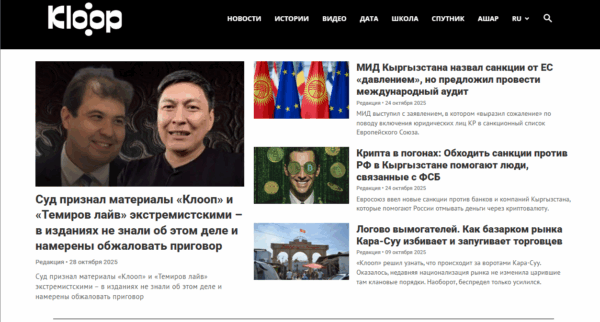Copyright thediplomat

A court in the Kyrgyz capital, Bishkek, declared the content published by Kloop, Temirov Live, and Ait, Ait Dese – as well as the activities of the outlets’ founders, Bolot Temirov and Rinat Tukhvatshin – extremist, in the latest salvo against the country’s independent media. According to a social media post regarding the case by Otkurbek Rakhmanov, general director of the Region TV channel (whom Kloop characterizes as a supporter of Kamshibek Tashiev, the head of the State Committee for National Security), the court ordered that the pages and activities of the media outlets named in the case be banned and additionally that “the distribution or re-publication of the materials of the mentioned media projects is subject to criminal liability in accordance with the Criminal Code of the Kyrgyz Republic.” In a statement published on October 28, Kloop noted that this is the first time a media outlet has been designated as extremist in Kyrgyzstan. Kloop reported that management at the targeted outlets were unaware of the court hearing and intend to appeal; they also don’t know specifically what content was deemed extremist. This is the latest chapter of a long-running campaign against independent media in Kyrgyzstan, which has escalated under the Japarov government. Kloop rose to particular prominence in November 2019 when it released an investigative report, put together in cooperation with the Organized Crime and Corruption Reporting Project (OCCRP) and RFE/RL, that exposed significant corruption in Kyrgyzstan’s customs service, including the transfer of more than $700 million out of the country. The investigation’s main source, an inside player named Aierken Saimaiti, was assassinated before it was published. The report triggered protests, and the main villain, a customs official named Raimbek Matraimov, tried to sue Kloop and the other outlets involved. The following year, in October 2020, the government of Sooronbay Jeenbekov was ousted. Within the month, Sadyr Japarov had risen from prison cell to president and Matraimov was arrested. He was soon after released, with the government claiming he’d pledged to repay the state. It was a cycle that would play out over and over again, with Matraimov effectively becoming the Japarov government’s favorite piggybank. What should have been vindication for Kloop, and its reporting, instead led to a pressure campaign that carried on from previous Kyrgyz governments’ efforts to close down the outlet. In September 2024, Kloop lost its battle in the Kyrgyz courts, with Kyrgyzstan’s Supreme Court deciding to leave unchanged a lower court’s ruling that the Kloop Media Foundation, the nonprofit behind Kloop, be liquidated. In September 2025, two Kloop cameramen were convicted on charges of conspiring to incite “mass unrest” – and sentenced to five years in prison – in a case that only referenced videos produced by Temirov Live, an outlet they did not work for. Witnesses who testified, mostly Kloop employees, denied having seen any calls for mass unrest from the two accused cameramen or the two accountants that were also charged. One of the expert witnesses testified that a slogan deployed by Temirov in the videos – “Freedom is not given, freedom is sought” – could be interpreted “as an incitement to action against the government,” but he also said that the videos contained no “direct calls” for such action. Temirov Live, and its founder Bolot Temirov, have also suffered gravely from the state’s ire. He was acquitted on drug charges in September 2022, in a case that human rights activists characterized as blatant persecution for his outlet’s work. Then Temirov was arrested again – days after dropping a new report airing allegations regarding Tashiev’s son’s business – and charged with forging documents. He was ultimately declared guilty and had his Kyrgyz citizenship stripped. Temirov was deported to Russia in November 2022. But that did not stop him. Neither did it stop the Kyrgyz government. In January 2024, Kyrgyz authorities arrested more than dozen journalists in a massive raid on local media outlets. Nine months later the trial concluded, mostly in acquittals – except for Temirov’s wife, Makhabat Tazhibek kyzy, and Azamat Ishenbekov, an akyn with the “Ait Ait Dese” project, who were sentenced to six and five years, respectively. Ait, Ait Dese is a uniquely Kyrgyz platform. It is a YouTube-based project of Temirov Live, which produces content highlighting human rights issues via performances by traditional poets, akyns. Using music and what can best be described in English as rapid-fire rapping, Ait, Ait Dese reached audiences in Kyrgyz in ways other media outlets simply could not. Leila Nazgul Seiitbek, an exiled Kyrgyz human rights activist, explained to OCCRP in March 2024, the power of akyns: The akyns are traditionally these voices that always spoke about the problems that the Kyrgyz people had. And it’s also traditional that the rulers never went after the akyns. That’s their job to speak about grievances, to make fun of politicians. Many people don’t watch things on YouTube if they are not traditionally Kyrgyz things. But people do go to concerts to listen to akyns, because that speaks to their heart. It’s something that they understand, something they grew up with.” In its October 28 statement, Kloop noted that “[i]t is now dangerous to like, comment on, or share these publications' content, as doing so could be considered support for an extremist organization and the dissemination of extremist materials.” But, Kloop stated, “it's still safe to watch and read.” “If you want to support the publications, please continue reading the materials and watch all the videos to the end – this will encourage social media algorithms to distribute the content.” Kyrgyzstan is just barely more than a month out from snap parliamentary elections.



